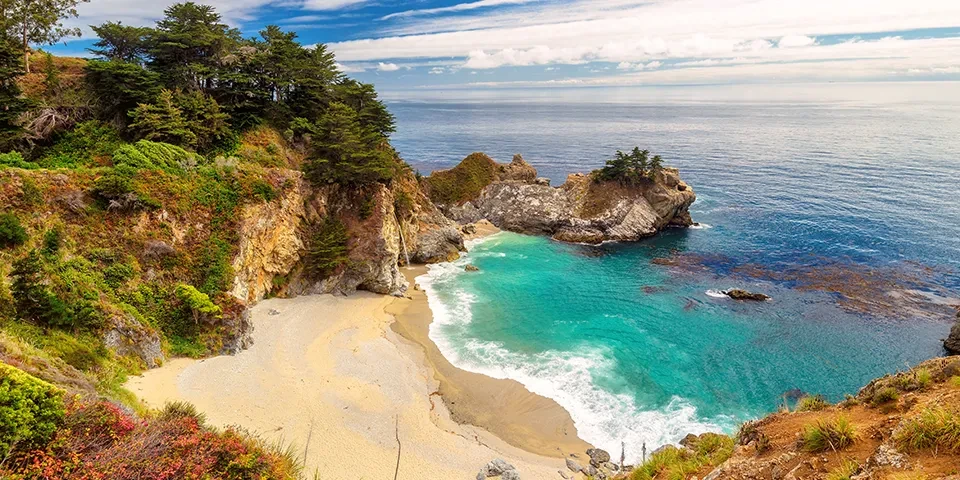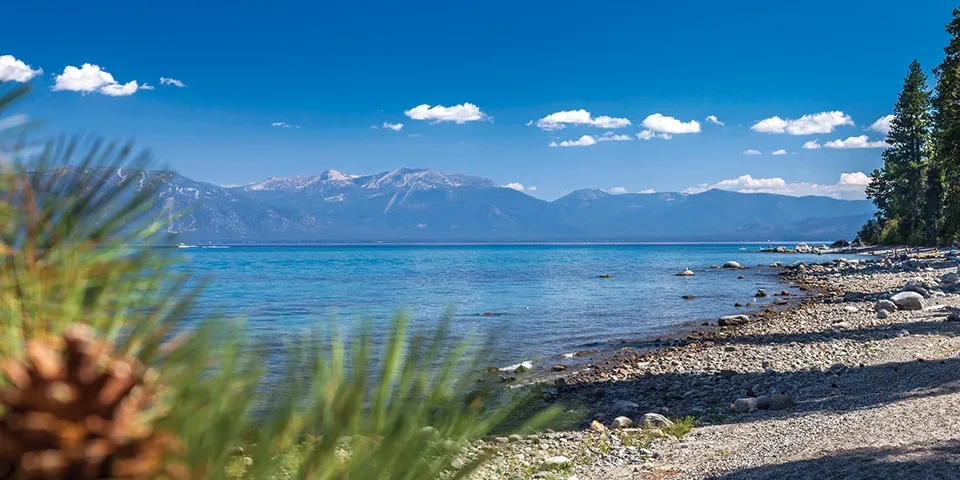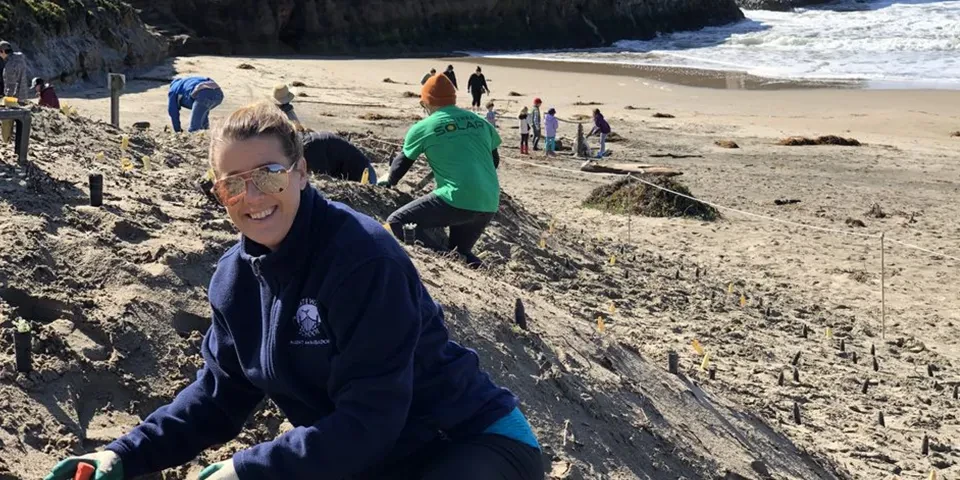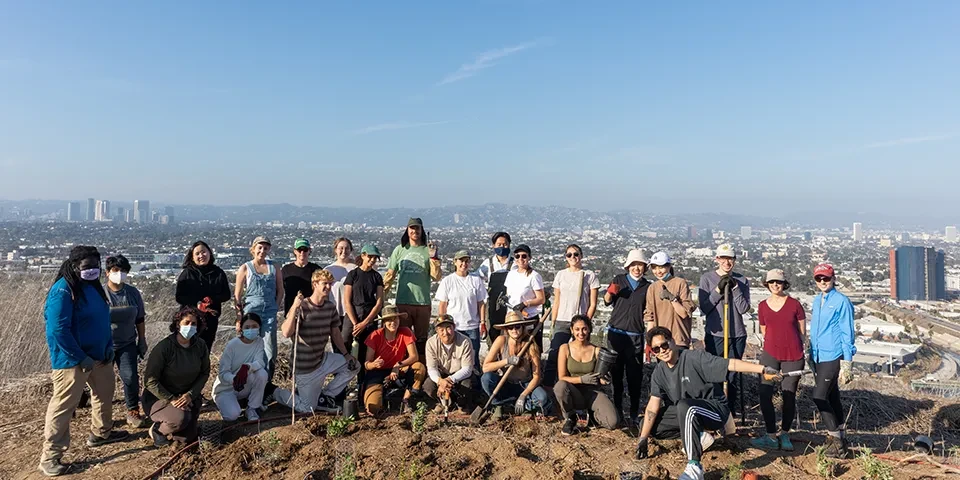Announcing our Building Climate Resilient Parks Grantees
California State Parks Foundation’s most recent grant round is a continuation of our climate resiliency work which aims to build climate resilient parks and communities so that California state parks can adapt to the impacts of climate change and remain protected and preserved for all Californians.
We are thrilled to provide 10 amazing state parks and park partner organizations with grants for programs that span across the state. The Building Climate Resilient Parks Grant opportunity includes $111,461.78 in grant funding that supports programs in one or more of the following four categories:
-
Assessment – Activities that assess climate threats to the park, risks to natural habitats, and biodiversity; both built and natural environments.
-
Restoration – Activities to restore the natural and built environments impacted by fires or sea level rise.
-
Preparedness – Activities that prepare for the real threat of climate change in parks.
-
Education – Activities that raise awareness of the impact of climate change and ways to engage in resilience activities.
California State Parks Foundation continues to recognize that climate change disproportionately affects low-income communities and communities of color. To address this, we ensured the programs we fund are aligned with our values of Justice, Equity, Inclusion, and Diversity. Recipients of these grants are either led by communities most affected by climate change or actively work to include these communities in the decision-making aspects of their program, as well as build trust-based relationships with these communities.
Meet our Building Climate Resilient Parks grantees and get an inside look at their upcoming projects!
Anahuak Youth Sports Association | Rio de Los Angeles State Park, Los Angeles State Historic Park, and Bowtie Demonstration Project | $10,000
Project: This project will engage Anahuak youth and families to continue Spanish language focused education through Saturday morning platicas (discussions) introducing them to brownfields, as well as host Anahuak’s 2022 youth tournament which will be named, “Playing for Brownfields to Parks” to create more awareness among youth, their families, and local communities.
Impact: By hosting the soccer tournament, Anahuak Youth Sports Association hopes to meet the community where they are, doing something that they value immensely for their children, families, and community. The tournament will create a guide for organizing that will include how to effectively communicate about climate resiliency to non-English speaking park goers. This guide will include the importance of green spaces in urban areas, understanding how communities use their parks, in which ways they feel connected to their parks, and how they can be part of the solution to climate resilient parks and communities.
California Native Plant Society | Portola Redwoods State Park, Big Basin Redwoods State Park, Henry Cowell Redwoods State Park, Henry W. Coe State Park, Julia Pfeiffer Burns State Park | $9,995.90
Project: California Native Plant Society staff will coordinate with California State Parks, UC Santa Cruz, California State University (CSU) Monterey Bay, San Jose State University, West Valley College (WVC), San Mateo Resource Conservation District, Amah Mutsun Land Trust, and other partners to target plant community types that will benefit from post-fire vegetation surveying including areas of varying burn severities.
Impact: Information gathered will inform fine-scale vegetation mapping and monitoring over time through the challenges of our changing climate and allow land managers at California state parks to evaluate and adapt management strategies for sensitive habitats in this Central Coast Region.
California State Parks, Angeles District Natural Resources Program | Leo Carrillo State Park | $9,964.00
Project: Through regular invasive plant removal, as part of an adaptive weed management and habitat restoration plan, the Angeles District Natural Resources Program hopes to reduce the coverage of the invasive plant canopy and invasive plant debris within the project area. This will help restore historical habitat and encourage existing native plants and seeds to re-colonize the project area.
Impact: Following completion of the maintenance treatments, a second vegetation survey to document native and non-native species in the project area will be conducted. This will monitor final site conditions and quantify final results for native and non-native cover. Restoring areas where the community type was historically present, and enhancing existing habitat is critically important to provide resiliency to withstand future climate related stress and habitat loss.
California State Parks, Sierra District | Ed Z'Berg Sugar Pine Point State Park, Plumas Eureka State Park | $6,530.00
Project: The California State Parks PORTS (Parks Online Resources for Teachers and Students) program is a free educational program connecting K-12 students to diverse natural, cultural, and historic places through a live interactive digital field trip experience delivered from a state park by state park staff directly to the classroom – and more recently to any remote learning location. The grant will continue the development of this new program focused on fire ecology for students grades 5-12.
Impact: The California State Parks PORTS program uniquely helps California State Parks build connections with California youth regardless of their location. This grant will help provide a framework for other parks interested in creating a PORTS program focused on fire ecology specific to their own parks.
Climate Resolve | Baldwin Hills Parklands | $10,000.00
Project: Climate Resolve is working with SLATE-Z, Sumire Gant Consulting, Adam Wheeler Design, and the Baldwin Hills Conservancy to develop an inclusive Community Resilience and Access Plan for the Baldwin Hills Parklands. From this plan, Climate Resolve will gather best practices and lessons from this unique project to create a guidance document that will be distributed to leaders of urban state parks in California to guide them in resilience planning.
Impact: This project will help California state parks in urban areas serve as centers of resilience for their surrounding communities. As a unique, first-of-its-kind project, the creation of a best practices document will enable parks across the state to increase resilience in their surrounding communities.
Crystal Cove Conservancy | Crystal Cove State Park | $10,000.00
Project: Crystal Cove Conservancy will create a Fire Ecology internship program during the 2022-2023 school year, which will engage a cohort of 12 high school interns to study the relationships between human activity, climate change, fire frequency, and changes in mammal biodiversity with the goal of identifying ways to shift our role in current fire regimes.
Impact: The Fire Ecology internship will support a climate resilient state park system by educating the next generation of park stewards and increasing the high school students’ awareness of wildfire and its connection to climate change. Through understanding and supporting actions that land managers need to take to reduce fire risk and helping land managers develop a deeper understanding of how repeated fires impact mammal biodiversity, interns will have a greater knowledge of the impacts of climate change. Interns will also share what they learn with their families and communities, increasing their resiliency and understanding of the fire-human interface.
Groundswell Coastal Ecology | Coastal State Parks and State Beaches in Northern Monterey Bay and the Central and Southern Santa Cruz Districts | $24,971.88
Project: The Monterey Bay Living Shorelines Program is a next step for efficiently building climate resilient coastal parks in central California. Groundswell Coastal Ecology will create a geodatabase of living shoreline sites that are attributed with characteristics relevant for ranking state park sites for prioritization of living shorelines projects.
Impact: The Monterey Bay Living Shorelines Program will help build resilient coastal state parks and beaches in the Monterey and Santa Cruz Districts by creating a prioritized set of living shorelines projects. Designed to protect and enhance state park facilities, infrastructure, access ways, and natural resources. This project will create a cue of projects that can utilize common templates, recognize efficiencies in permitting, share regional resources, support a continuous implementation, integrate with regional planning, and be designed to serve communities and natural resources that are most in need of support.
Los Angeles Audubon Society/Nature Nexus Institute | Baldwin Hills Scenic Overlook | $10,000.00
Project: Climate Action Youth Network student interns will participate in weekly climate action workshops to learn about the threats from climate change, and actions they can take to ameliorate these threats of temperature rise, heat islands, elevated levels of carbon dioxide, and the risk of wildfire in dry biomass areas. The Climate Action Youth Network, which includes a student-run Greenhouse Program and student fellow participants from West Los Angeles Conservation Studies Certificate Program, will partake in wildlife surveys and phenology journaling to collect data of the parklands and observe and note changes over time. With guidance, student interns will develop plans to restore native habitat in the Baldwin Hills Parklands and lead community volunteers in habitat restoration events to remove invasive species in the parks to reduce the risk of wildfire ignition and spread, and plant native coastal sage scrub that will help to reduce the heat island effect, improve slope stability, and improve air and soil quality through carbon sequestration.
Impact: Through the Climate Action Youth Network students will expand their knowledge-base working with urban habitat restoration ecologists, gain work experience for job or college applications, and have access to a pipeline for possible future employment. This program will also support a climate resilient park system by increasing carbon sequestration, geological stability, native plant and wildlife biodiversity, aesthetic values through introduction of diverse species and careful placement of vegetation to enhance visitor experience and reduce fire risk through replacement of weedy annual species, that are more prone to fire ignition and spread, with native perennial species.
Sonoma Ecology Center | Sugarloaf Ridge State Park | $10,000
Project: This project will offer a course covering basic ecology, watershed concepts, geology, wildlife, plants, human impacts, regional stories, and global environmental issues through the UC California Naturalist Program. Course instructors are local field experts and scientists that have relevant and local data on the impacts of humans and climate change in state parks. Sugarloaf Ridge State Park will be one of nine sites across California to introduce the newly developed UC Climate Stewards Course. The seven-week course seeks to foster a committed corps of volunteers ready to effectively engage in transformative local solutions to promote community and ecosystem resilience in a changing climate. The UC Climate Stewards Course will introduce students to social-emotional learning and trauma-aware practices, climate change communication, climate science, and community resilience planning.
Impact: The course will integrate locally relevant themes of fire, water, and inclusion. Through guest speakers, field activities, and participatory science students will learn about and discuss principles and practices towards increasing community and ecosystem resilience to fire drought, and floods. The California Naturalist Course will promote environmental literacy and stewardship through discovery and action working directly with our local natural resources and will guide the cohort through an intensive experience that takes a focus on Sugarloaf Ridge State Park features. The rich science-based curriculum is supported by hands-on field experiences that help capture the essence of the program.
Jen Toy – Test Plot | Rio de Los Angeles State Park, Baldwin Hills Scenic Overlook | $10,000.00
Project: Test Plot is a land-based practice in Los Angeles, California that celebrates the labor involved in land care. Test Plot seeks to establish longer term, care-based relationships between local communities and the public lands they engage with by providing an opportunity for deeper engagement with urban parks, which are often under-resourced and in need of care and attention, and a key aspect to building climate resiliency in urban areas.
Impact: This project will document the perspectives from multiple participants/stakeholders on what is working within the current program and provide a platform (i.e. a series of workshops at both parks) to enable residents to share lessons learned and knowledge both within their own stewardship group but also between groups across Los Angeles. Developing knowledge and skills and creating a system to support others to do the same work in other state parks will support a more climate resilient state park system. From this a publication on types of models with specific examples and evidence will be created. The goal is to develop and communicate insights that will: a) enable Test Plot to grow and scale to other communities b) guide and improve the outcomes of environmental stewardship initiatives and investments at state parks c) use materials to advocate for legislation that supports climate resilience in urban parklands.
Support for our Building Climate Resilient Parks Grant Round was generously provided by Edison International, Pacific Gas and Electric Company, The Peter and Mary Russo Family Foundation, as well as our California State Parks Foundation members and donors.



